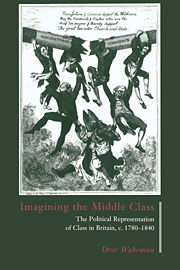Book contents
- Frontmatter
- Contents
- List of figures
- Acknowledgments
- 1 Imagining the ‘middle class’: an introduction
- PART I AGAINST THE TIDE
- Prelude to the 1790s: was the French Revolution a ‘bourgeois revolution’?
- 2 The uses of ‘middle-class’ language in the 1790s
- 3 Friends and foes of the ‘middle class’: the dialogic imagination
- 4 The political differentiation of social language: the debate on the triple assessment, 1797–1798
- Postlude to the 1790s: the uses of ‘bourgeois revolution’
- PART II THE TUG OF WAR
- PART III WITH THE TIDE
- Epilogue
- Index
3 - Friends and foes of the ‘middle class’: the dialogic imagination
Published online by Cambridge University Press: 08 January 2010
- Frontmatter
- Contents
- List of figures
- Acknowledgments
- 1 Imagining the ‘middle class’: an introduction
- PART I AGAINST THE TIDE
- Prelude to the 1790s: was the French Revolution a ‘bourgeois revolution’?
- 2 The uses of ‘middle-class’ language in the 1790s
- 3 Friends and foes of the ‘middle class’: the dialogic imagination
- 4 The political differentiation of social language: the debate on the triple assessment, 1797–1798
- Postlude to the 1790s: the uses of ‘bourgeois revolution’
- PART II THE TUG OF WAR
- PART III WITH THE TIDE
- Epilogue
- Index
Summary
THE TWO NATIONS! THE VIEW FROM BELOW
[The French National Assembly represented] the majority of that middle rank among whom almost all the sense and virtue of society reside.
There never was, or will be, in civilized society, but two grand interests, that of the RICH and that of the Poor. The differences of interest among the several classes of the rich will be ever too slender to preclude their conspiracy against mankind.
(James Mackintosh, Vindiciae Gallicae, 1791)So which was it to be? Was society according to James Mackintosh structured around a distinct and virtuous ‘middle class’, or was it fundamentally composed only of rich and poor – eternally torn between the two, the whole two, and nothing but the two? In our sociologically trained ears, this apparent contradiction rankles; but Mackintosh's writing was not hampered by such considerations. At this early moment in our story, the political implications of such different portrayals of society had not yet been as rigidly circumscribed as they were to become later in the decade; and thus Mackintosh could resort to both in the same text, if they could be of service. And indeed, in mid-1791, vacillating between enchantment with the French Revolution and wariness lest the whole thing would be carried too far, Mackintosh's uncertain political views could indeed be served by both.
The potential political alignment of a ‘middle-class’-based vision of society has been laid out in the previous chapter. Mackintosh's alternative social scheme, a binary one which allowed no room or effective role for a ‘middle class’, also carried in it the seeds of its own political message.
- Type
- Chapter
- Information
- Imagining the Middle ClassThe Political Representation of Class in Britain, c.1780–1840, pp. 74 - 107Publisher: Cambridge University PressPrint publication year: 1995



